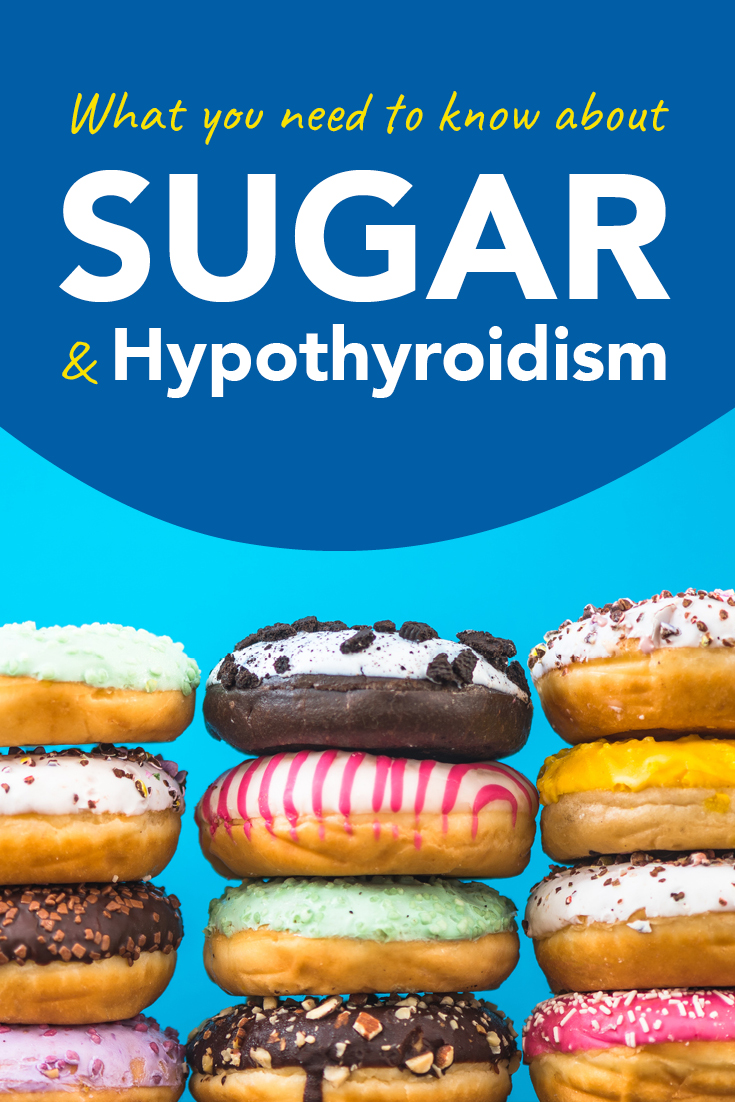Expert Advice

Acella Pharmaceuticals, LLC is partnering with Heather Procknal, NBC-HWC-CHC, to bring greater awareness to the importance of thyroid care and education. This post was sponsored by Acella Pharmaceuticals.
Disclaimer: The information provided is for educational purposes only and does not substitute professional medical advice. Consult a medical professional or healthcare provider before beginning any exercise, fitness, diet, or nutrition routine. Acella Pharmaceuticals does not endorse, promote or sponsor any products or brands mentioned in this article. The views expressed here are those of the author.
While searching for ways to help manage your hypothyroid symptoms, you may have heard that reducing your intake of certain potentially triggering foods such as gluten, soy, dairy, and sugar may help. It can feel overwhelming to say goodbye, even if only temporarily, to many of these foods, but some may argue that sugar is the hardest to break up with.
In 2010 the U.S. Food and Drug Administration (FDA) began recommending that daily sugar consumption, including high fructose corn syrup and sucrose, be limited to no more than 6 teaspoons or 25 grams for women and no more than 9 teaspoons or 38 grams for men.1 Following this recommendation can be challenging because sugar is hidden everywhere.
Did you know that there are over 60 different names for sugar?
Some names are more obvious than others, like brown sugar, corn syrup, and cane sugar. Others can be much more tricky to identify, such as turbinado, muscovado, and Barbados, whose all sound more like places you'd go for a vacation than names for sugar. All joking aside, it is difficult to shake the sugar habit, especially if you’ve got a sweet tooth.2
It’s important to point out that all sugar isn’t “bad." For example, an apple has a glycemic index of about 38 to 43. Apples are considered to be a lower GI fruit, along with grapes, oranges, and peaches. Fruits tend to be higher in fiber than many processed foods that contain added sugar. The fiber in whole fruit helps you feel fuller for longer. Fruit also offers additional nutritional benefits and will not spike your blood sugar the same way that a candy bar would. So reaching for fruit as a sweet, healthy snack is the way to go!3
Why does sugar get such a bad rap for those with hypothyroid disease?
Inflammation and blood sugar imbalances are two of the driving forces behind many hypothyroid symptoms, including:
When you eat sugar, your brain produces huge surges of dopamine, a "feel-good" hormone that spikes, then crashes, once the sugar is metabolized. This crash leads to more intense sugar cravings, thus perpetuating the sugar-crash-craving cycle.
Not only do processed foods make you crave more sugar, but the artificial colors, flavors, and preservatives that come along with them can negatively impact your gut health and cause inflammation. This is bad news for your immune system because a “leaky gut” and an overtaxed liver have difficulty converting the T4 hormone to T3 to pass along to your other vital organs and muscles. Because the liver modulates thyroid hormone metabolism, any inefficiencies may lead to further thyroid dysfunction and symptom flare-ups. You can see how this domino effect can spiral out of control when sugar consumption is high.
Not sure where to start to kick your sugar addiction
Here are some tips to help with sugar cravings and reduce your sugar intake.
Make a list of things you can do instead of turning to sugar. What hobbies and activities do you enjoy? Have this list accessible for quick reference during high stress or times of boredom.
Before eating something, ask yourself the following: “Am I truly hungry? Or, am I just bored, tired, stressed, angry, lonely, thirsty, (insert other feeling or emotion here), etc.” Sometimes you may reach for sugar and other comforting foods to fill an emotional void rather than because you are truly hungry. Use this as an opportunity to check in with yourself.
Remember, self-care is NOT “selfish.” What is something non-food related that you could do to treat yourself?
Drink a glass of water – even slight dehydration can cause you to feel hungry, which can usually be remedied by drinking a glass of water. Be sure that you’re getting the recommended 64 ounces of water daily.
Get out of the kitchen. By removing yourself from the kitchen, you make it easier to say no to sweets and other savory items that may contain excess sugar.
Go for a walk. Get your body moving and focus on being outside or in nature. The endorphins released from exercise can replace the dopamine hit you get from consuming sugar.
Snack on some fresh blueberries or frozen grapes, both of which are lower on the GI scale.
Make some ice cubes from watermelon juice and use those to jazz up your plain or sparkling water!
Enjoy a cup of herbal tea, such as hibiscus flower or peppermint.
Listen to music or meditate – again, shifting your focus inward can help reduce stress and bust cravings.
Try some gentle yoga or stretching. Legs up the wall or child's pose can be very grounding and relaxing.
Brush your teeth. Having minty fresh breath can reduce food cravings by interrupting your thought pattern of wanting to eat. Plus, studies show that mint may have appetite-suppressing effects on the brain.
As you reduce your sugar intake, you may find that your taste for sugar changes, and you crave it less and less. Notice how your mind and body feel when you take a break from sugar and begin to create new habits that support your overall health and well-being.

REFERENCES: 1. U.S. Food and Drug Administration. High Fructose Corn Syrup Questions and Answers. https://www.fda.gov/food/food-additives-petitions/high-fructose-corn-syrup-questions-and-answers. 2. University of California San Francisco. Hidden in Plain Sight Added sugar is hiding in 74% of packaged foods https://sugarscience.ucsf.edu/hidden-in-plain-sight. 3. Schwarz JM, Schutz Y, Piolino V, Schneider H, Felber JP, Jéquier E. Thermogenesis in obese women: effect of fructose vs. glucose added to a meal. https://www.ncbi.nlm.nih.gov/pubmed/1566826.
Note that DTE products, including NP Thyroid®, have not been reviewed by the FDA for safety or efficacy.
IMPORTANT RISK INFORMATION, INCLUDING BOXED WARNING & INDICATIONS
Important Risk Information
Drugs with thyroid hormone activity, alone or together with other therapeutic agents, have been used for the treatment of obesity. In euthyroid patients, doses within the range of daily hormonal requirements are ineffective for weight reduction. Larger doses may produce serious or even life-threatening manifestations of toxicity, particularly when given in association with sympathomimetic amines such as those used for their anorectic effects.
- NP Thyroid® is contraindicated in patients with uncorrected adrenal insufficiency, untreated thyrotoxicosis, and hypersensitivity to any component of the product.
- In the elderly and in patients with cardiovascular disease, NP Thyroid® should be used with greater caution than younger patients or those without cardiovascular disease.
- Use of NP Thyroid® in patients with diabetes mellitus or adrenal cortical insufficiency may worsen the intensity of their symptoms.
- The therapy of myxedema coma requires simultaneous administration of glucocorticoids.
- Concomitant use of NP Thyroid® with oral anticoagulants alters the sensitivity of oral anticoagulants. Prothrombin time should be closely monitored in thyroid-treated patients on oral anticoagulants.
- In infants, excessive doses of NP Thyroid® may produce craniosynostosis.
- Partial loss of hair may be experienced by children in the first few months of therapy but is usually transient.
- Adverse reactions associated with NP Thyroid® therapy are primarily those of hyperthyroidism due to therapeutic overdosage.
- Many drugs and some laboratory tests may alter the therapeutic response to NP Thyroid ®. In addition, thyroid hormones and thyroid status have varied effects on the pharmacokinetics and actions of other drugs. Administer at least 4 hours before or after drugs that are known to interfere with absorption. Evaluate the need for dose adjustments when regularly administering within one hour of certain foods that may affect absorption.
- NP Thyroid® should not be discontinued during pregnancy, and hypothyroidism diagnosed during pregnancy should be promptly treated.
Indications
NP Thyroid® (thyroid tablets, USP) is a prescription medicine that is used to treat a condition called hypothyroidism from any cause, except for cases of temporary hypothyroidism, which is usually associated with an inflammation of the thyroid (thyroiditis). It is meant to replace or supplement a hormone that is usually made by your thyroid gland.
NP Thyroid® is also used in the treatment and prevention of normal functioning thyroid goiters, such as thyroid nodules, Hashimoto’s thyroiditis, multinodular goiter, and in the management of thyroid cancer.
Revised
10/2023
You Are About To Leave This Website
By clicking continue, this link will take you to a website to which Alora Pharmaceuticals’ Policies & Terms of Use do not apply.
^Based on prescriptions filled, NP Thyroid® is the #1 Prescribed DTE in the United States. Source: IQVIA National Prescription Audit (NPA) data on file. Acella Pharmaceuticals, LLC.
